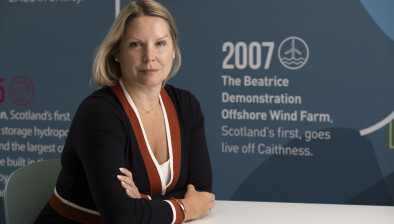Scottish Renewables identifies six key innovation areas
 Industry body Scottish Renewables has identified six key innovation areas that could drive the future of sustainable energy in the UK.
Industry body Scottish Renewables has identified six key innovation areas that could drive the future of sustainable energy in the UK.
The organisation’s Innovation Paper reveals a ‘world-leading’ energy system could be delivered if a five-year £500 million fund pledged by the UK Government is used correctly.
Identified priority areas include:
• Wave and Tidal energy – with facilities like the European Marine Energy Centre in Orkney providing test opportunities.
• Storage technologies – which can enable increased renewables capacity and provide a services to the management of our electricity system, as well as empowering communities and consumers.
• Floating Offshore Wind – which could open huge areas of the world’s deepest oceans to green energy generation.
• Low-Carbon Heat – which accounts for 46 per cent of UK energy demand, but of which only 4.9 per cent was renewable in 2014. Decarbonising the sector will mean fully developing new technologies, supporting their large-scale deployment and integrating them into our wider energy system.
• Systems Integration – thinking about heat, transport and electricity sectors as one system will allow us to be ‘smarter’ in the way we use power and drive efficiencies, increase security and reduce costs.
• Flexible networks – could, according to the Committee on Climate Change (CCC), help save consumers up to £3.5 billion per year. Securing the technology to deliver “a more flexible power system” will require a range of technologies such as Active Network Management, demand-side response, storage and increased interconnection, all of which are yet to be fully developed.
Hannah Smith, policy officer at Scottish Renewables, said the £500m fund committed by the UK government has the potential to “drive dramatic advances in our energy system”.
“Our renewable energy industry has come a long way since the first hydropower and wind projects of the 19th Century, due in no small part to the impressive list of technical and engineering innovations coming out of the UK,” she said.
“We welcome the Chancellor’s recent commitment to continue this by doubling DECC’s innovation programme budget. We believe developing an Energy Innovation Strategy to guide this investment would get the most out of every pound spent.
“Government is in a unique position to mobilise a variety of resources and agencies, creating the right landscape for innovation to occur. This would lay the foundations for British businesses developing innovative products and services to flourish.
“Our world lead in tidal technology, for example, owes much to the continued development of onshore wind, with technology for the former deriving from decades of study into the latter.
“Now new technologies like wave energy and storage have the potential to revolutionise the way we produce energy.”















